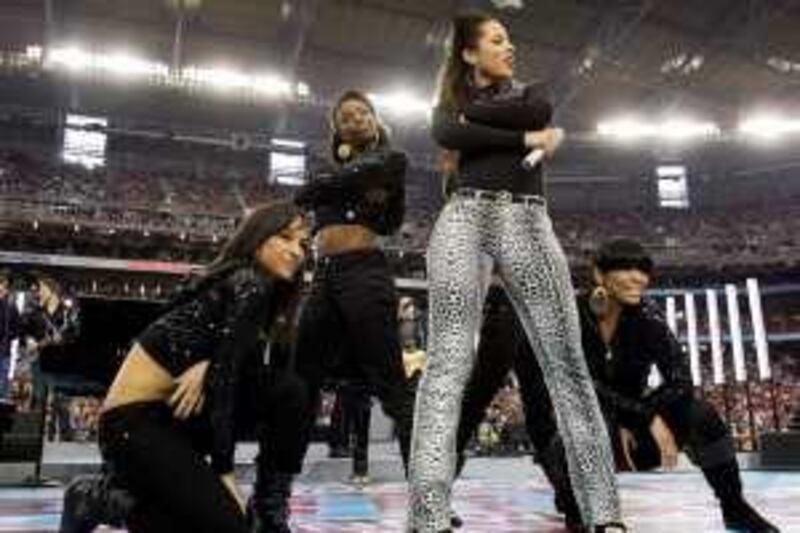Today, America takes a break from post-election euphoria and financial panic to indulge in the annual ritual that is Super Bowl Sunday. The Pittsburgh Steelers and the Arizona Cardinals will square off in Tampa, Florida for the National Football League championship title. But this is way bigger than any mere sporting event.
As well as being a massive commercial platform for advertisers and corporate sponsors, the Super Bowl offers a potentially huge career boost for the musical acts chosen to play there, but should they strike the wrong note, shame and scandal, too. At Sunday's game, the Super Bowl XLIII, Jennifer Hudson will sing the national anthem while Bruce Springsteen fills the coveted half-time performance slot. Two Oscar-winning, flag-waving American idols. What can possibly go wrong?
Predicted to earn higher TV ratings than the Oscars, the Beijing Olympics and President Obama's inauguration combined, Sunday's football and music extravaganza looks likely to draw a domestic audience of around 140 million viewers - roughly half the US population. Second only to Thanksgiving in food consumption, Super Bowl Sunday is both an unashamed celebration of commercial excess and a gigantic advert for America itself. But it is also a patriotic day of unity, baffling to outsiders, which is now firmly woven into the national psyche.
"Remember, the US is a huge country," says Steven Wells, a British-born sport and rock journalist based in Philadelphia. "It actually has very few universal rituals. Audiences that once gathered around the water cooler to talk about the new happening TV show are fractured into a patchwork of disassociated groups. The last event watched by more than 50 per cent of Americans was the final episode of M*A*S*H. Thus, the Super Bowl has a fame well beyond its worth as an actual sporting event. Even if less than half the nation is watching, everyone knows about it."
Music has always been part of Super Bowl Sunday, although initially it was little more than a humble sideshow. Launched in Los Angeles in January 1967, the prototype cup final between the NFL and its younger rival the American Football League (AFL) was initially called - with typical American understatement - the World Championship Game. Half-time music was provided by marching bands from the universities of Michigan and Arizona. In 1970, the two leagues merged and the Super Bowl was officially born.
The tradition of the Super Bowl opening with a stirring celebrity version of The Star-Spangled Banner only came much later, when the Texan pop siren Vicki Carr sang at the Pasadena Rosebowl in 1977. The national anthem became a regular fixture in 1982, when Diana Ross established a trend for soul divas that later extended to Whitney Houston, Natalie Cole, Mariah Carey, Aretha Franklin and Beyoncé. But various male crooners have also performed this grand opening number, among them Barry Manilow, Neil Diamond and Harry Connick Jr.
In the 1970s and 1980s, the Super Bowl began to feature half-time performances by veteran artists, including Ella Fitzgerald and Chubby Checker. But it was not until 1991 that this interval show became a regular part of the package, largely in a bid to boost TV ratings and advertising revenue. Teenage-pop sensations New Kids on the Block were the unlikely pioneers, followed by Gloria Estefan, Michael Jackson, Diana Ross, Stevie Wonder and others. By 1994, multi-artist shows were being squeezed into the 12-minute slot: Aerosmith and *N'Sync in 2001, Shania Twain with No Doubt in 2003 and so on.
Artists are no longer paid for the Super Bowl's half-time show, but it is easy to understand why they are still eager to play to TV audiences in excess of 100 million. In 2002, U2 boosted sales of three albums by more than 100 per cent with their New Orleans Superdome appearance. Last year, Tom Petty used his four-song set in Miami as a platform to sell tickets for a highly successful US summer tour. And right now, by happy coincidence, Springsteen has a newly released album and tour to promote.
But Super Bowl Sunday has not always been a musical triumph. Even non-sport fans will be familiar with the biggest controversy in the event's history: the infamous "wardrobe malfunction" five years ago when Janet Jackson and Justin Timberlake performed together in Houston, Texas. The incident provided rich material for comedians and newspaper columnists, but speaks volumes about the place of the Super Bowl in American life.
In recent years, the NFL's choice of Super Bowl performers has become more cautious. The organisers have favoured veteran 1960s and 1970s legends such as Billy Joel, Paul McCartney and The Rolling Stones. It is hard to imagine this Sunday's musical headliners ruffling too many feathers. Hudson and Springsteen are the perfect mainstream mix for the first Super Bowl of the Obama era: America's sweetheart, bouncing back from family tragedy, and America's conscience, roaring blue-collar songs of hard-won hope in troubled times. Finally, after eight divisive years, this is one day when all US citizens get to sing in harmony.





